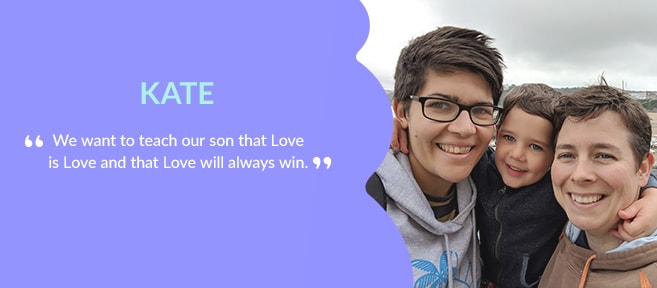Q: In which “type” of family structure did you grow up yourself?
A: My sister and I grew up in your ‘typical’ 80’s/90’s family. One mum, one dad. But they were very diverse for that period. My mum had a number two haircut, for example! Early on they taught us about treating everyone as equals.
Sharon also grew up in a very typical, nuclear family set up with her mum, dad, and younger brother. Dad worked for most of her childhood, whereas her mum bounced between a SAHM and part time worker.
Oddly, we grew up in the same area (even being born in the same hospital!) just five years apart
Q: When did you wish to have your own children?
A: Goodness, when I was in my mid to late twenties! Before then, I had no inclination to have children. I wasn’t even that maternal. It’s only when I had been with my wife for a number of years that my body told me I suddenly needed children. It was quite a shock.

Q: How did the family construct in which you now live evolve?
A: Sharon and I met online over ten years ago and now the rest is history. When we finally decided to have children, we had been together for around 5 years and then we were trying for another two years. It felt like a lifetime, but at the same time it’s crazy that we now have a three year old.
Q: Have your children questioned their family model? Have you even been questioned about your family model at school/kindergarten?
A: T is probably too young to really question things, but he sure as hell corrects people when they ask about his ‘Mummy & Daddy’. In regards to other people? No. Not at all. Which is a good thing, I think. People are more accepting, or they certainly are where we live. We’re incredibly lucky as I know not everywhere is like that.
Q: How do people in your environment respond to your family? Have you ever felt discriminated against as a family? If so, how did you handle the situation?
A: They welcome it with open arms! They find it interesting and wonderful at the same time – people often tell us. There’s probably only been one occasion where we felt discriminated against, and that was when our son hadn’t been invited to a party that all his other friends had – but then I tell myself that that is their problem and not ours. If anything, I feel sorry for them and wouldn’t want my son around someone like that any way. There’s some people you just cannot engage with.
Q: On a scale of 0 to 10: How much do you feel your family model is accepted by society? (0 = not accepted at all, 10 = fully accepted)
A: 8-ish. I am very aware that there are groups out there that don’t accept or like us and think that we’re damaging our children, so that’s what lowers the score – we’re not blind. However, things have changed drastically over the last few years and I can see people fighting back against discrimination. I think it’s because families like mine are actively making themselves more visible. Plus, the media are (slowly) becoming more inclusive in their advertising.

Q: What’s the best thing about your family?
A: Probably the love we show for each other and other people. We want to teach our son that Love is Love and that Love will always win.
Q: What do you wish for your family in the future?
A: That we’re represented in mainstream society and seen for the family that we are. I want to see families like us on the TV and in books. I don’t want to see that look in people’s eyes when they’re trying to work us out.

About Kate:
Kate and Sharon live near Brighton with their three year old son ‘T’. They write a blog called ‘Lesbemums’ which details life as a Same Sex Family. They talk about a variety of topics from family life, their travels, to LGBT issues.
You can check out other We Are Family interviews with more parent bloggers here.
